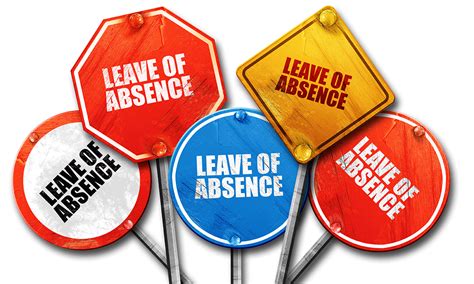Leave Of Absence: Understanding Its Significance

A leave of absence is an extended period of time that an employee takes off from work for personal or professional reasons. It may be paid or unpaid, and it can last several weeks or even months. Understanding the significance of a leave of absence is essential for both employers and employees. In this article, we will discuss the importance of a leave of absence and how to handle it effectively.
Why is a Leave of Absence Important?
1. Personal Reasons
Employees may need to take a leave of absence for personal reasons such as illness, pregnancy, or family emergencies. It provides them with the time and flexibility they need to take care of themselves or their loved ones without worrying about their job security. A leave of absence ensures that employees can return to work when they are ready and able to do so.
2. Professional Development
Employees may also take a leave of absence for professional development such as furthering their education or attending conferences. This allows them to gain new skills and knowledge that they can bring back to the workplace, benefiting the company and their career growth.
3. Mental Health
A leave of absence can also be beneficial for an employee’s mental health. It provides them with a break from work-related stress, allowing them to focus on their well-being and recovery. This benefits both the employee and the company, as a healthy and happy employee is more productive.
How to Handle a Leave of Absence Effectively
1. Communication
Effective communication between the employee and employer is key when handling a leave of absence. The employee should inform their employer as soon as possible and provide sufficient information about the reason for their leave. The employer should also communicate their policies and procedures regarding leaves of absence, including the duration and pay eligibility.
2. Planning
Both the employee and employer should plan for the leave of absence. The employee should provide a timeline for their absence and any necessary documentation, such as medical certificates. The employer should also plan for the absence by delegating tasks to other employees or hiring temporary replacements if necessary.
3. Follow-up
Regular follow-up between the employee and employer during the leave of absence is important. The employer should check in with the employee to ensure their well-being and progress. The employee should also keep their employer informed about any changes in their situation or return to work date.
4. Reintegration
When the employee returns to work, the employer should ensure a smooth reintegration process. This may include providing training or updates on any changes that occurred during the employee’s absence. The employee should also be given time to adjust and catch up on any missed work.
FAQs
1. Is a leave of absence paid or unpaid?
It depends on the employer’s policies and the reason for the leave. Some employers may offer paid leave for certain reasons such as illness or maternity, while others offer unpaid leave. It is important to check with your employer regarding their policies.
2. How long can a leave of absence last?
A leave of absence can last anywhere from a few weeks to several months. The duration depends on the reason for the leave and the employer’s policies.
3. Can an employer deny a leave of absence request?
Yes, an employer can deny a leave of absence request if it does not meet their policies or if it would cause undue hardship to the company. However, employers must provide a valid reason for denying the request.
4. Can an employee be terminated while on a leave of absence?
No, an employee cannot be terminated while on a leave of absence. It is illegal for employers to terminate employees for taking a leave of absence.
Conclusion
A leave of absence is an important benefit that provides employees with the time and flexibility they need for personal or professional reasons. Effective communication, planning, follow-up, and reintegration are key to handling a leave of absence successfully. Employers should be aware of their policies and legal obligations regarding leaves of absence, while employees should inform their employer as soon as possible and provide necessary documentation.
